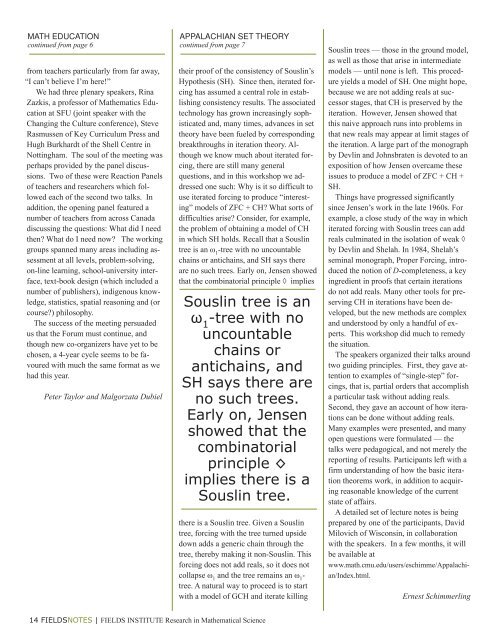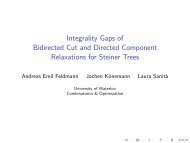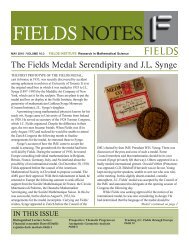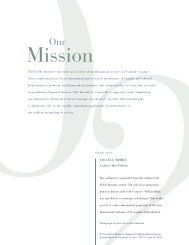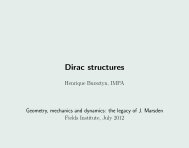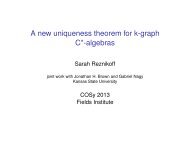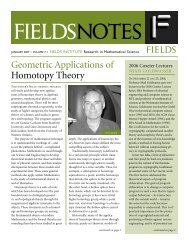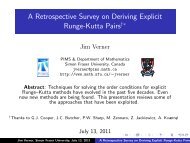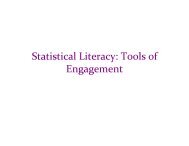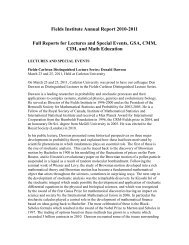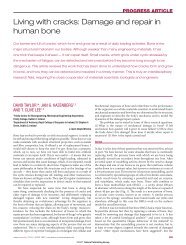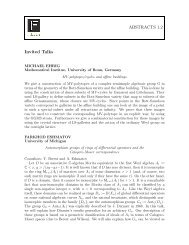Fields Notes, September 2009 - Fields Institute - University of Toronto
Fields Notes, September 2009 - Fields Institute - University of Toronto
Fields Notes, September 2009 - Fields Institute - University of Toronto
Create successful ePaper yourself
Turn your PDF publications into a flip-book with our unique Google optimized e-Paper software.
MATH EDUCATION<br />
continued from page 6<br />
from teachers particularly from far away,<br />
“I can’t believe I’m here!”<br />
We had three plenary speakers, Rina<br />
Zazkis, a pr<strong>of</strong>essor <strong>of</strong> Mathematics Education<br />
at SFU (joint speaker with the<br />
Changing the Culture conference), Steve<br />
Rasmussen <strong>of</strong> Key Curriculum Press and<br />
Hugh Burkhardt <strong>of</strong> the Shell Centre in<br />
Nottingham. The soul <strong>of</strong> the meeting was<br />
perhaps provided by the panel discussions.<br />
Two <strong>of</strong> these were Reaction Panels<br />
<strong>of</strong> teachers and researchers which followed<br />
each <strong>of</strong> the second two talks. In<br />
addition, the opening panel featured a<br />
number <strong>of</strong> teachers from across Canada<br />
discussing the questions: What did I need<br />
then? What do I need now? The working<br />
groups spanned many areas including assessment<br />
at all levels, problemsolving,<br />
online learning, schooluniversity interface,<br />
textbook design (which included a<br />
number <strong>of</strong> publishers), indigenous knowledge,<br />
statistics, spatial reasoning and (or<br />
course?) philosophy.<br />
The success <strong>of</strong> the meeting persuaded<br />
us that the Forum must continue, and<br />
though new coorganizers have yet to be<br />
chosen, a 4year cycle seems to be favoured<br />
with much the same format as we<br />
had this year.<br />
Peter Taylor and Malgorzata Dubiel<br />
APPALACHIAN SET THEORY<br />
continued from page 7<br />
their pro<strong>of</strong> <strong>of</strong> the consistency <strong>of</strong> Souslin’s<br />
Hypothesis (SH). Since then, iterated forcing<br />
has assumed a central role in establishing<br />
consistency results. The associated<br />
technology has grown increasingly sophisticated<br />
and, many times, advances in set<br />
theory have been fueled by corresponding<br />
breakthroughs in iteration theory. Although<br />
we know much about iterated forcing,<br />
there are still many general<br />
questions, and in this workshop we addressed<br />
one such: Why is it so difficult to<br />
use iterated forcing to produce “interesting”<br />
models <strong>of</strong> ZFC + CH? What sorts <strong>of</strong><br />
difficulties arise? Consider, for example,<br />
the problem <strong>of</strong> obtaining a model <strong>of</strong> CH<br />
in which SH holds. Recall that a Souslin<br />
tree is an ω 1 tree with no uncountable<br />
chains or antichains, and SH says there<br />
are no such trees. Early on, Jensen showed<br />
that the combinatorial principle ◊ implies<br />
Souslin tree is an<br />
ω 1 tree with no<br />
uncountable<br />
chains or<br />
antichains, and<br />
SH says there are<br />
no such trees.<br />
Early on, Jensen<br />
showed that the<br />
combinatorial<br />
principle ◊<br />
implies there is a<br />
Souslin tree.<br />
there is a Souslin tree. Given a Souslin<br />
tree, forcing with the tree turned upside<br />
down adds a generic chain through the<br />
tree, thereby making it nonSouslin. This<br />
forcing does not add reals, so it does not<br />
collapse ω 1 and the tree remains an ω 1 <br />
tree. A natural way to proceed is to start<br />
with a model <strong>of</strong> GCH and iterate killing<br />
14 FIELDSNOTES | FIELDS INSTITUTE Research in Mathematical Science<br />
Souslin trees — those in the ground model,<br />
as well as those that arise in intermediate<br />
models — until none is left. This procedure<br />
yields a model <strong>of</strong> SH. One might hope,<br />
because we are not adding reals at successor<br />
stages, that CH is preserved by the<br />
iteration. However, Jensen showed that<br />
this naive approach runs into problems in<br />
that new reals may appear at limit stages <strong>of</strong><br />
the iteration. A large part <strong>of</strong> the monograph<br />
by Devlin and Johnsbraten is devoted to an<br />
exposition <strong>of</strong> how Jensen overcame these<br />
issues to produce a model <strong>of</strong> ZFC + CH +<br />
SH.<br />
Things have progressed significantly<br />
since Jensen’s work in the late 1960s. For<br />
example, a close study <strong>of</strong> the way in which<br />
iterated forcing with Souslin trees can add<br />
reals culminated in the isolation <strong>of</strong> weak ◊<br />
by Devlin and Shelah. In 1984, Shelah’s<br />
seminal monograph, Proper Forcing, introduced<br />
the notion <strong>of</strong> Dcompleteness, a key<br />
ingredient in pro<strong>of</strong>s that certain iterations<br />
do not add reals. Many other tools for preserving<br />
CH in iterations have been developed,<br />
but the new methods are complex<br />
and understood by only a handful <strong>of</strong> experts.<br />
This workshop did much to remedy<br />
the situation.<br />
The speakers organized their talks around<br />
two guiding principles. First, they gave attention<br />
to examples <strong>of</strong> “singlestep” forcings,<br />
that is, partial orders that accomplish<br />
a particular task without adding reals.<br />
Second, they gave an account <strong>of</strong> how iterations<br />
can be done without adding reals.<br />
Many examples were presented, and many<br />
open questions were formulated — the<br />
talks were pedagogical, and not merely the<br />
reporting <strong>of</strong> results. Participants left with a<br />
firm understanding <strong>of</strong> how the basic iteration<br />
theorems work, in addition to acquiring<br />
reasonable knowledge <strong>of</strong> the current<br />
state <strong>of</strong> affairs.<br />
A detailed set <strong>of</strong> lecture notes is being<br />
prepared by one <strong>of</strong> the participants, David<br />
Milovich <strong>of</strong> Wisconsin, in collaboration<br />
with the speakers. In a few months, it will<br />
be available at<br />
www.math.cmu.edu/users/eschimme/Appalachian/Index.html.<br />
Ernest Schimmerling


